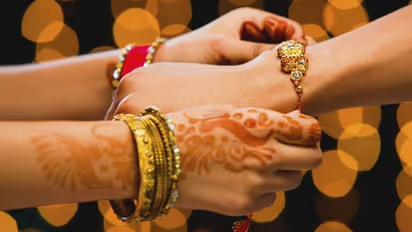Raksha Bandhan 2024 Shubh Muhurat and Date: Significance, history, importance of Hindu festival

Synopsis
Raksha Bandhan 2024 Date & Time: Raksha Bandhan, slated on August 16, 2024, is more than just a holiday; it is a celebration of love, trust, and the eternal tie siblings share. It is based on mythology and has been passed down through generations, and it continues to bring families and communities together across India.
Raksha Bandhan, a pleasant occasion held throughout India and among Hindus worldwide, honours the link between siblings. This article dives into the rich history, cultural significance, and lasting significance of Raksha Bandhan, scheduled on August 19, 2024. Raksha Bandhan is still a treasured celebration in modern India, strengthening familial bonds and reinforcing virtues such as love, duty, and compassion. It serves as a reminder of siblings' enduring link, regardless of geographical distance or life's obstacles. The event also promotes unity and inclusion by bringing communities together for celebration and mutual respect.
Rituals and tradition
Raksha Bandhan begins with siblings conducting traditional traditions. Sisters diligently prepare for the event, selecting rakhis that symbolise their fondness and ceremonially tying them around their brothers' wrists. This act is accompanied by prayers for their health and success. Brothers respond with presents and pledges of lifetime protection and support.
Also Read: Top 5 tech gifts under Rs 2,000 to surprise your sibling this Raksha Bandhan
History of Raksha Bandhan
Raksha Bandhan is rooted in Hindu mythology and historical stories. One of the most beloved stories is that of Draupadi and Lord Krishna. According to legend, when Draupadi tore a piece of her sari to bandage Krishna's injured wrist during a battle, Krishna was moved by her gesture and promised to protect her. This deed inspired a custom in which brothers promise to protect their sisters in exchange for the rakhi, a holy thread placed around their wrist.
Another tale tells about Queen Karnavati of Chittor sending a rakhi to Mughal Emperor Humayun to beg protection against the invading Bahadur Shah of Gujarat. Moved by her appeal, Humayun instantly set out to protect her country, embodying the festival's ethos of brotherhood and togetherness.
Raksha Bandhan observed on the full moon of Shravana, honours sibling connections via customs such as tying rakhis and giving gifts. It symbolises love, protection, and friendship.
Raksha Bandhan 2024: Date and Mahurat time
Purnima Tithi Begins -August 19 at 3:04 AM
Purnima Tithi Ends -August 19 at 11:55 PM
Raksha Bandhan Bhadra Tail - August 19: 9:51 AM - 10:53 AM
Raksha Bandhan Bhadra face - August 19: 10:53 AM - 12:37 PM
Raksha Bandhan Bhadra End Time - August 19: 1:30 PM
Time of Raksha Bandhan Celebration - August 19: 1:30 PM - 8:27 PM
Afternoon Auspicious Time for Raksha Bandhan Celebration - August 19: 1:30 PM - 3:39 PM
Pradosh Period for Raksha Bandhan - August 19: 6:12 PM - 8:27 PM
Also Read: Raksha Bandhan 2024: 7 sweets to put on Rakhi platter
Raksha Bandhan 2024: Significance
The fundamental idea of Raksha Bandhan is the link between brothers and sisters, which represents protection and mutual respect. The event has ancient Hindu roots and is observed on the full moon day of the Shravana lunar month (typically in August).
It tells various mythical and historical events, including the goddess Lakshmi tying a rakhi to King Bali for protection and wealth. Notably, the celebration goes beyond blood links; it is an opportunity to create bonds of friendship and solidarity, since those who are not connected by blood participate in comparable rites.
Raksha Bandhan traditions often involve tying a rakhi, or holy thread, around the brother's wrist, placing a tilak (a mark on the forehead) as a symbol of blessings and protection, and exchanging presents. These deeds are accompanied by celebratory dinners and family reunions, strengthening familial bonds and fostering mutual affection. Overall, Raksha Bandhan is an emotional celebration of the protective relationship between siblings, with ceremonies expressing deeply ingrained ideals of care, respect, and solidarity.
Catch all the latest Entertainment News from movies, OTT Release updates, television highlights, and celebrity gossip to exclusive interviews and detailed Movie Reviews. Stay updated with trending stories, viral moments, and Bigg Boss highlights, along with the latest Box Office Collection reports. Download the Asianet News Official App from the Android Play Store and iPhone App Store for nonstop entertainment buzz anytime, anywhere.